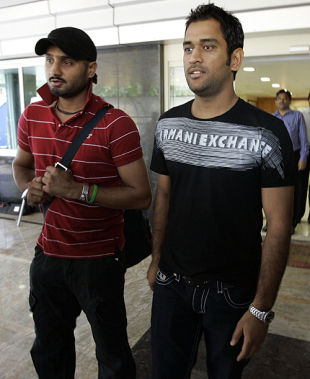 | ||
The Indian board has backed its players and rejected the contentious 'whereabouts' clause in the amended World Anti Doping Agency (WADA) code, which was implemented by the ICC from January 1, as it was "unreasonable". This decision was taken at a meeting of the BCCI's working committee in Mumbai on Sunday and places the ICC in a difficult position.
The ICC's executive board, of which India is a member, will now discuss the issue to find a way forward. A resolution would ideally have to be reached before the start of the next ICC event, the Champions Trophy in September in South Africa, where India is one of the eight participating teams. International players from all countries in the ICC's anti-dope testing pool have agreed to abide by the code, despite privacy and practicality concerns about the 'whereabouts' clause, except the 11 from India. The code prescribes stringent penalties in case of default (see box).
MS Dhoni, Harbhajan Singh and Yuvraj Singh, who were present at the BCCI meeting, maintained that security concerns remained if they had to reveal their location in advance for an hour every day for the next three months to facilitate out-of-competition testing, as mandated by the 'whereabouts' norm in the amended WADA code.
In response to these concerns that were expressed earlier too, the ICC had promised to implement a "reasonable" testing programme that will be conducted around matches, and not on holidays or when players are on vacation. The ICC had also sent its company lawyer to address the BCCI's concerns on the WADA system during the Sunday meeting. But an Indian board official told Cricinfo that Iain Higgins, the lawyer, was not called upon at all by the BCCI's working committee.
Shashank Manohar, the BCCI president, said the board did not have a problem with dope testing but only with the system of keeping checks when the players are not engaged in training camps or playing matches. Manohar said the BCCI would suggest to the ICC that instead of players revealing their whereabouts information in advance, the governing body should consult the Indian board which will ensure that the player will be available within 24 hours at the required location for testing.
The suggestion, however, is unlikely to lead to a solution as the WADA, which is an independent anti-doping watchdog set up by the International Olympic Committee, has made it clear in a recent statement that no exemption to the code will be granted to any federation. If the Indian board refuses to budge on the issue, the ICC will have to consider pulling out of the WADA umbrella, which will undermine its fight to ensure a clean sport, its credibility and reputation on the world stage, and rule out cricket from global multi-sport events such as Asian Games and Olympics.
"We believe the clause with regard to whereabouts of cricketers is unreasonable for three reasons," Manohar said. "Firstly, some Indian cricketers have security cover, and when you have a security cover, you cannot disclose your whereabouts to a third person. Secondly, the privacy of individuals cannot be invaded. Third, the constitution of India gives a guarantee to every citizen regarding his privacy which cannot be invaded. We can appreciate players being tested even when they are not playing. But if ICC or WADA want to test the players, they can inform the board which will get the players at the required location within 24 hours. This is our suggestion."
Manohar claimed that though the anti-doping code has been in discussion since 2006, when the ICC became a WADA signatory, and the amended version was approved by the ICC board last year, the testing system, including the whereabouts clause, was never deliberated upon in any of the governing body's meetings.
Asked what the ICC would do next, Manohar, who represents India on the governing body's board, said, "The implications of this decision would be decided after we write to the ICC. Today, it would be jumping the gun."
Brian Murgatroyd, the ICC spokesperson, said the ICC and BCCI were committed to finding a practical solution. "We are aware of the issues of concerns, and we are confident they can be adhered to everyone's satisfaction. The matter will now be considered by ICC board," he said.
The Federation of International Cricketers' Associations (FICA), of which India is not a member, has warned that if the ICC did not penalise India's players for failing to submit to the new anti-doping norms in time, it would ensure that players from all other countries would be relieved from similar obligations.
Concerns about the 'whereabouts' clause in the amended WADA code is not a cricket-specific issue and has been treated as a matter of concern in other sports, particularly team sports such as football. FIFA, football's governing body, is still not completely WADA-compliant due to similar concerns and has suggested that only players they deem as high-risk be included in the testing pool. Tennis stars such as Roger Federer and Rafael Nadal have also spoken out against revealing whereabouts information in advance. There is a meeting of world player associations, including FICA, in London in early September with WADA to discuss these concerns. The ICC will also raise these concerns with WADA at a review meeting this year-end.
Another Indian board official said after Sunday's meeting that the ICC will have to renegotiate the issue with WADA. "The ICC have to take up a dialogue with WADA," Rajiv Shukla, a BCCI vice-president, said. "Football players also declined to sign the clause and the FIFA is engaged in negotiation with WADA, so that would be the case of ICC also," Shukla said.
No comments:
Post a Comment